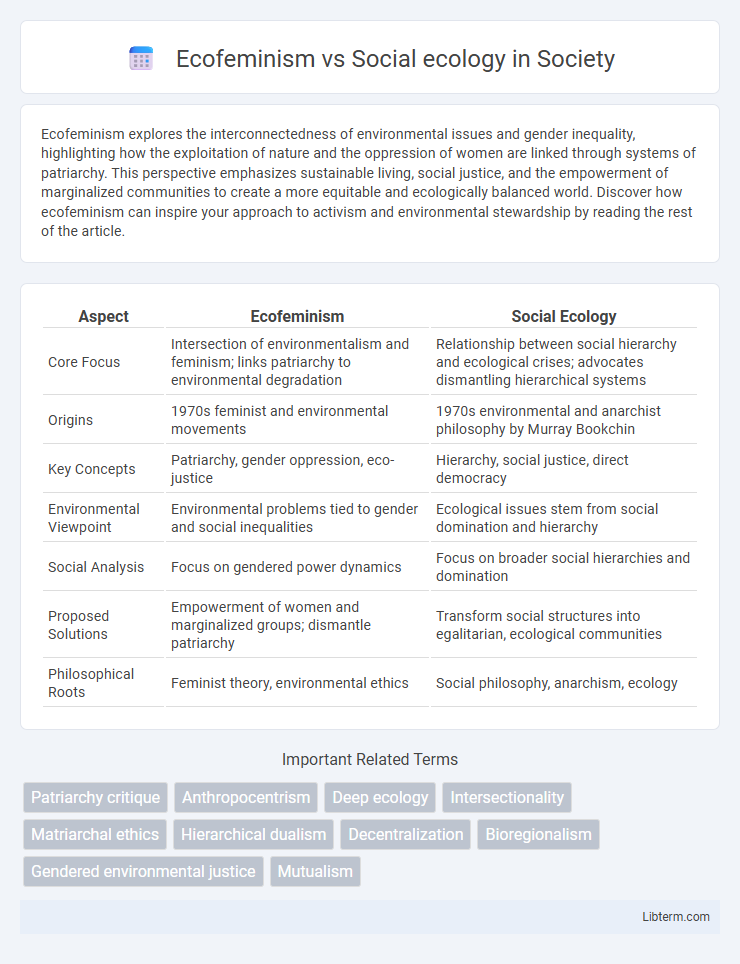Ecofeminism explores the interconnectedness of environmental issues and gender inequality, highlighting how the exploitation of nature and the oppression of women are linked through systems of patriarchy. This perspective emphasizes sustainable living, social justice, and the empowerment of marginalized communities to create a more equitable and ecologically balanced world. Discover how ecofeminism can inspire your approach to activism and environmental stewardship by reading the rest of the article.
Table of Comparison
| Aspect | Ecofeminism | Social Ecology |
|---|---|---|
| Core Focus | Intersection of environmentalism and feminism; links patriarchy to environmental degradation | Relationship between social hierarchy and ecological crises; advocates dismantling hierarchical systems |
| Origins | 1970s feminist and environmental movements | 1970s environmental and anarchist philosophy by Murray Bookchin |
| Key Concepts | Patriarchy, gender oppression, eco-justice | Hierarchy, social justice, direct democracy |
| Environmental Viewpoint | Environmental problems tied to gender and social inequalities | Ecological issues stem from social domination and hierarchy |
| Social Analysis | Focus on gendered power dynamics | Focus on broader social hierarchies and domination |
| Proposed Solutions | Empowerment of women and marginalized groups; dismantle patriarchy | Transform social structures into egalitarian, ecological communities |
| Philosophical Roots | Feminist theory, environmental ethics | Social philosophy, anarchism, ecology |
Introduction to Ecofeminism and Social Ecology
Ecofeminism explores the interconnectedness of environmental degradation and patriarchal oppression, emphasizing the role of gender in ecological crises. Social ecology, pioneered by Murray Bookchin, analyzes environmental problems through the lens of hierarchical social structures and advocates for decentralized, ecological communities. Both frameworks critique dominant power systems but prioritize different root causes and solutions for environmental justice.
Historical Roots and Philosophical Foundations
Ecofeminism emerged from feminist theory and environmentalism in the 1970s, emphasizing the interconnected oppression of women and nature through patriarchal structures, rooted in the works of thinkers like Francoise d'Eaubonne. Social ecology, developed by Murray Bookchin in the 1960s, critiques hierarchical social systems as the primary cause of ecological crises, advocating for decentralized, egalitarian communities based on anarchist principles. Both movements share a commitment to dismantling domination but differ as ecofeminism focuses on gendered oppression intertwined with environmental degradation, while social ecology stresses broader social hierarchies and ecological balance through communal responsibility.
Core Principles of Ecofeminism
Ecofeminism centers on the intrinsic link between the oppression of women and environmental degradation, emphasizing the interconnectedness of social justice and ecological health. It advocates for dismantling patriarchal systems that exploit both nature and marginalized communities, promoting gender equality as vital for sustainable environmental practices. Core principles include valuing empathy, nurturing relationships, and recognizing the roles of women as stewards of the earth within holistic ecological frameworks.
Key Tenets of Social Ecology
Social ecology emphasizes the interdependence of social and environmental systems, advocating for the dismantling of hierarchical structures that perpetuate ecological destruction and social oppression. It promotes decentralized, directly democratic communities as essential for achieving ecological balance and social justice. Core tenets include the rejection of domination, the belief in ecological sustainability through social transformation, and the integration of human and natural communities for holistic well-being.
Intersection of Gender, Ecology, and Social Structures
Ecofeminism analyzes the intersection of gender, ecology, and social structures by highlighting how patriarchal systems perpetuate environmental degradation and gender oppression simultaneously. Social ecology examines ecological crises through the lens of hierarchical social systems, emphasizing that environmental problems are deeply rooted in social inequalities and power imbalances. Both frameworks intersect by addressing how gender roles and social hierarchies contribute to ecological injustice, advocating for systemic transformation to achieve environmental sustainability and social equity.
Anthropocentrism vs. Biocentrism in Both Movements
Ecofeminism critiques anthropocentrism by emphasizing the interconnected oppression of women and nature, advocating for a biocentric worldview that values all life forms equally. Social ecology challenges hierarchical structures and promotes the dissolution of anthropocentric dominance to achieve ecological balance through decentralized, egalitarian communities. Both movements converge on rejecting human-centered dominance, yet ecofeminism integrates feminist perspectives while social ecology centers on social hierarchies and environmental justice.
Critiques and Controversies Surrounding Ecofeminism
Ecofeminism faces critiques for its perceived essentialism, as it often links women intrinsically to nature, which some argue reinforces gender stereotypes and overlooks cultural diversity. Critics also challenge ecofeminism's sometimes ambiguous political strategy, questioning its effectiveness in addressing systemic environmental issues compared to approaches like social ecology, which emphasizes hierarchical power structures and social transformation. Controversies persist over ecofeminism's integration of spirituality and ethics, which some see as limiting rigorous scientific and policy-oriented environmental advocacy.
Social Ecology: Challenges and Debates
Social ecology addresses environmental issues by emphasizing the intrinsic link between social hierarchies and ecological degradation, challenging the dominance of capitalist and hierarchical systems. Key debates focus on its potential oversimplification of social structures, the need to incorporate diverse cultural perspectives, and tensions between community-based solutions versus large-scale environmental policies. Critics argue that balancing social justice with ecological sustainability demands more inclusive strategies that account for global inequalities and intersectional identities.
Practical Applications and Contemporary Activism
Ecofeminism emphasizes the interconnectedness of gender oppression and environmental degradation, leading to practical applications such as inclusive environmental education, community-based conservation projects spearheaded by women, and advocacy for rights-based approaches to natural resource management. Social ecology prioritizes dismantling hierarchical social structures to address ecological crises, with contemporary activism focusing on decentralized urban planning, cooperative housing initiatives, and grassroots movements that link social justice to environmental sustainability. Both frameworks influence activist networks by promoting participatory governance and intersectional strategies that challenge systemic inequalities while fostering ecological resilience.
Future Directions and Synthesis of Ideas
Ecofeminism emphasizes the interconnectedness of environmental justice and gender equality, proposing future directions that integrate indigenous knowledge and marginalized voices into ecological policy-making. Social ecology advocates for dismantling hierarchical social structures as a prerequisite to achieving environmental sustainability, suggesting a synthesis of grassroots community organizing with systemic political reform. Combining these frameworks highlights the potential for a holistic approach to ecological crises, fostering inclusive, equitable, and sustainable environmental solutions.
Ecofeminism Infographic

 libterm.com
libterm.com